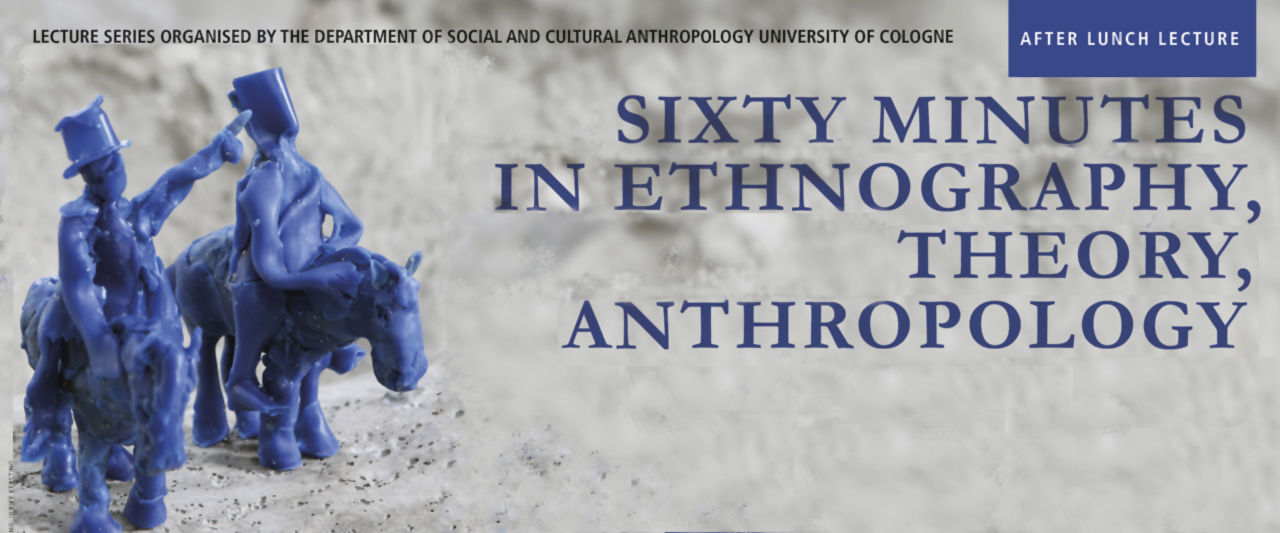
Summer 2024 | 60 min in Ethnography, Theorie, Anthropology

New Frontiers of Anthropological Research: Insights from the Department
WEDNESDAY 2pm – 3pm
DoSCA LIBRARY | Hauptgebäude Bauteil 6, 1st floor
Organized by:
Prof. Dr. Michaela Pelican (mpelican@uni-koeln.de) & Sina Plücken (splueck1@uni-koeln.de)
Programme Summer 2024
17.04.2024 | Sandro Simon (University of Cologne) | Freedom within Unfreedom: Conceptualising Contemporary 'Gleaning'
17.4. Sandro Simon (University of Cologne)
Freedom within Unfreedom: Conceptualising Contemporary 'Gleaning'
Abstract:
Negotiated around a social contract of benevolence and marginality, contemporary gleaning simultaneously confirms and decenters socio-economic hierarchies and invokes the possibilities of life entwined in-, yet transgressing racialised and gendered dispossession and ruination under late Capitalism.
Gleaning describes the age old right of the subaltern to the remainder and the obligation of the dominant to produce and/or allow access to the remainder under the premise of marginality. This paper traces descriptions of gleaning across space and time before focussing on two contemporary examples from the Sine-Saloum Delta, Senegal. The first inquires how gleaning for molluscs in the rising and warming deltaic waters is safeguarded as a distinctly female practice and its profitabilty obscured by appeasing ancestral guardian spirits and by evoking a longstanding female subalternity and gleaning’s historical embedding in norms of benevolence and mutual aid. Simultaneously, gleaning allows women to eschew labour relations introduced e.g. by NGO projects. The second example inquires how deltaic deck hands gleaned molluscs from the bycatch of industrial trawlers. By performing the marginality of this bycatch while redescribing its value and exchanging it along female networks, they realised their own gains from it, renegotiated ownership and possession as well as precarious labour. Exploring marginal potentials of given circumstances marked by anthropocenic and capitalist volatilities, gleaning as what I term a ’minor tactic’ thus attunes to- and creates distinct, if entwined minor niches within hierarchical socio-economic relations and their dynamics of dispossession and ruination. It is a fragile practice, permeated by indeterminacy and limits and both confirms and decenters these relations, while breathing a sense of justice and figuring as a larger promise that questions the giveness of hierarchies, the character of work/labour and the establishment of property and value. As such it also allows for a heuristic beyond both romanticisation and dark anthropology.
15.05.2024 | Atiyeh Azarshab (University of Cologne, Humboldt Scholarship) | Social and Cultural Characteristics of Balochistan in contemporary Iran
15.5. Atiyeh Azarshab (University of Cologne, Humboldt Scholarship)
Social and Cultural Characteristics of Balochistan in contemporary Iran
Abstract:
I am currently doing my postdoc research on the women of Balochistan (Southeast of Iran). This project includes different parts, all of which are focused on examining the identity dynamics of Baloch women in contemporary Iran. The chapter that I am writing now is about examining the cultural and social situation of Balochistan in the contemporary era of Iran. To write this chapter as well as my book, I use the methods of documentary studies, interviews and also my own experiences as a member of this ethnic.
The basic foundations of the contemporary social and cultural conditions of Balochistan were created in the middle of the 18th century, and gradually, with the expansion of the power of the “Sardars” of the Balochistan region, the political, social and cultural system of Balochistan became more and more complicated. The social and cultural conditions of Balochistan can be divided and studied into two parts. An important factor that has caused this separation is the division of Balochistan by the British government into two eastern and western parts during the Qajar rule of Iran. Eastern Balochistan was placed under British supervision and Western Balochistan was given to Iran. In this part of the book, I want to show how the social and cultural characteristics of Balochistan of Iran were before the creation of political borders by the British and what changes were made in it after the separation. I will also examine the parts that have remained unchanged. The end of this chapter is actually the beginning of the next discussions in which I examine the impact of these conditions and mechanisms on the status and identity of Baloch women. I also want to show in which direction these factors take women's identification.
12.06.2024 | Julia Brekl and Wisse van Engelen (University of Cologne) | The (re)vitalization of herding and changing human-cattle relations in northern Botswana
12.6. Julia Brekl and Wisse van Engelen (University of Cologne)
The (re)vitalization of herding and changing human-cattle relations in northern Botswana
Abstract:
Cattle play an important role in the lives of most Batswana. However, only few people herd their cattle nowadays. The reasons for the disappearance of herding are varied, but today most cattle on communal rangelands roam freely and unattended. In northern Botswana, where communal rangelands border on protected areas, cattle face the risks of getting eaten by predators or getting infected by pathogens. In turn, farmers often retaliate on predators, and the government has built veterinary fences to keep cattle separate from wildlife disease reservoirs. Neither of these reactions offers a satisfactory way of living with wildlife, and some say that the revitalization of herding is needed. The Herding 4 Health programme, founded by Conservation International and the Peace Parks Foundation, aims to do exactly that. But to what extent is it indeed returning to past herding practices, and to what extent does it introduce something new? How is this programme implemented in communities, and how is it received? In this talk, we will present the work of two NGOs implementing this programme in two different sites in northern Botswana and discuss the ways it changes existing human-cattle relations.
26.06.2024 | Gerda Kuiper (and students) (University of Cologne) | The institute library: A decolonizing examination
26.6. Gerda Kuiper (and students) (University of Cologne)
The institute library: A decolonizing examination
Abstract:
How did the collection of our institute’s library develop? How well are indigenous authors represented in the collection? And what do the library users think of the library collection? These are questions that were investigated by a small but dedicated group of students in a seminar I taught in the winter semester of 2023-2024. We built on discussions among librarians about questions of representation and decolonization – debates that so far apparently not have reached anthropological libraries. We also looked in detail at particular parts of the collection in our own library, such as the classification system, and the presence of books collected by an office that was connected to the colonial-revisionist movement in the 1930s and 1940s. Finally, we carried out a short survey among the users of our library about their experiences with and wishes for this library. In this 60-minutes session, I would like to share some of our findings from the course and, based on those outcomes, raise questions for further discussion.
10.07.2024 |Annika Benz (University of Cologne) | (Re)Searching for Collaboration/Embracing Academic Discomfort: Practical Lessons from Fieldwork for Change
10.7. Annika Benz (University of Cologne)
(Re)Searching for Collaboration/Embracing Academic Discomfort: Practical Lessons from Fieldwork for Change
Abstract:
Anthropology’s “decolonial turn” has caused greater popularity of participatory and collaborative approaches to research. With great popularity comes the danger of poor practice – models of collaborative research have been heavily altered to fit existing academic structures. To counteract this trend – and to recognize the need for extra scrutiny – I (re)search for collaboration within the literature of participatory action research (for example Fals-Borda 1977). PAR originated in liberation movements around the globe and looks to democratize knowledge-making and ground these processes in real life needs and learning. By referring to examples from my own ethnographic fieldwork with activists from the climate (justice) movement space in Germany, I illustrate how the essence of collaboration is to embrace academic discomfort (Banks 2016) and mess (Cook 2009) and to let these sensations make structural changes to our research practice and output.
Viele Grüße
Contact:
Phone +49 (0)221 470 2609
E-mail splueck1@uni-koeln.de
 Office Hours
Office Hours
By appointment during office hourse (Tuesday, Wednesday, Friday)
Please write an E-Mail.Currently Taught Courses
E-mail splueck1@uni-koeln.de
 Office Hours
Office HoursBy appointment during office hourse (Tuesday, Wednesday, Friday)
Please write an E-Mail.



